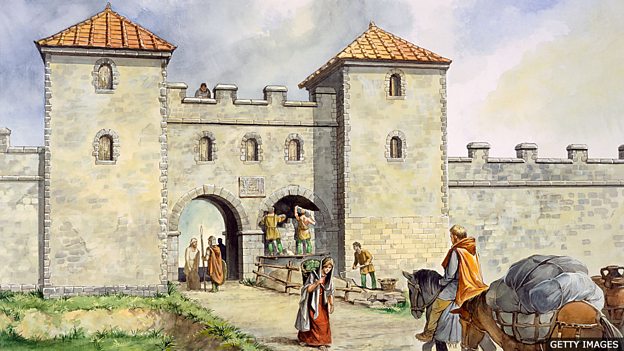隨身英語
How the Romans influenced English 羅馬文明對英語語言的影響

羅馬人在公元43年至410年間生活在英國。羅馬人對英語語言的影響深遠,直到今天,人們仍在使用一些由拉丁語衍變的詞匯,尤其是與食物、飲品、建筑以及英國地名有關的詞匯。本文介紹羅馬文明對英語語言的影響。
詞匯:Latin 拉丁語
The Romans lived in Britain between 43AD and 410AD but their legacy is still felt today and not just in physical ruins. The Romans left us language, including some common English words.
During the Roman Empire, Latin, an ancient language, was spoken in many parts of Britain. While the Romans wrote in classical Latin, they conversed in vulgar Latin – colloquial, everyday language that was used between soldiers and in trade. Because of trade, words that stuck often relate to food and drink, such as ‘wine’, which came from the Latin ‘vinum’. Others relate to dwellings such as ‘kitchen’, derived from the verb ‘cook’, and ‘wall’, which originally referred to a stake or post outside a fort.
Settlements and roads in Roman times were extensive. The word ‘street’, used generally as well as being used for specific names of streets, originally came from ‘strata’ which meant paved road. On a similar note, academic research from the field of linguistics indicates many well-known place names in the UK owe their origin to Latin. For example, the Romans used ‘castrum’ to refer to a city, which developed into the common place ending -chester, -caster or -cester. Consider Manchester. It is a former Roman fort which was known as Mamuciam. Other places with Roman derivations include Lancaster and Leicester.
A significant impact on English which came from the Romans is the use of the Roman alphabet. Manuscripts of Old English texts have shown a version not unalike written English today. Differences include some letters however, such as two symbols called ‘ash’ and ‘eth’. Nowadays you are more likely to see these symbols in a guide to pronunciation.
So, even though 1,600 years have passed, the Romans live on.
詞匯表
legacy 遺產
ruins 遺址
Empire 帝國
ancient 古老的
converse 和…交談
vulgar 通俗的
colloquial 口語的,非正式的
trade 買賣,貿易
stuck 保留下來
wine 紅酒
dwellings 房屋
stake 樁子
fort 堡壘
settlements 定居點
extensive 廣闊的,覆蓋范圍廣的
paved 鋪砌的
owe their origin 起源于
former 早前的
derivations 衍生物,起源
alphabet 字母表
manuscript 手寫本
測驗與練習
1. 閱讀課文并回答問題。
1. True or false? The Romans left behind physical ruins and some language.
2. What language did the Romans write in?
3. Why did words related to food and drink stay in English?
4. What did the Latin word ‘strata’ mean?
5. Which three places originally derived from Latin place names?
2. 選擇意思恰當的單詞或詞組來完成下列句子。
1. All that is left of the civilization are _______ of ancient buildings.
settlements ruins fort dwelling
2. Zoe didn’t enjoy her _______ job as much as her new one.
ancient colloquial vulgar former
3. They _______ luxury goods at the market.
alphabet trade manuscript language
4. His novel was considered his _______ when he died.
origin derivation left legacy
5. He had studied both contemporary and _______ acting.
classical extensive significant everyday
答案
1. 閱讀課文并回答問題。
1. True or false? The Romans left behind physical ruins and some language.
True. They left physical ruins and some common words still used today.
2. What language did the Romans write in?
The Romans wrote in classical Latin.
3. Why did words related to food and drink stay in English?
Because they were used in trade.
4. What did the Latin word ‘strata’ mean?
‘Strata’ originally meant ‘paved road’ and evolved into the word ‘street’.
5. Which three places originally derived from Latin place names?
Manchester, Lancaster and Leicester.
2. 選擇意思恰當的單詞或詞組來完成下列句子。
1. All that is left of the civilization are ruins of ancient buildings.
2. Zoe didn’t enjoy her former job as much as her new one.
3. They trade luxury goods at the market.
4. His novel was considered his legacy when he died.
5. He had studied both contemporary and classical acting.



